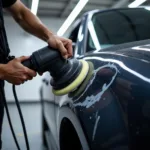Car paint repair is an essential aspect of vehicle maintenance, preserving both its aesthetic appeal and its resale value. Whether dealing with minor scratches, significant dents, or extensive paint damage, understanding the process and options available can save you time and money while ensuring a quality repair. This guide delves into the various facets of car paint repair, from DIY fixes to professional interventions.
Understanding the Different Types of Car Paint Damage
Car paint can suffer from a variety of damage, each requiring a specific approach to repair. Common types include:
- Scratches: These range from clear coat scratches to deep gouges that penetrate the primer and metal.
- Chips: Small pieces of paint that have chipped away, often due to rocks or road debris.
- Dents: While not directly paint damage, dents often involve paint scratches or chipping.
- Fading and Oxidation: Prolonged exposure to sunlight can cause the paint to lose its vibrancy and protective layer.
- Rust: If left untreated, scratches and chips can expose the metal underneath, leading to rust formation.
Choosing the right repair method depends on the severity and type of damage. For instance, a minor scratch might only require a touch-up pen, while a deep dent requires more extensive bodywork and repainting. Understanding these differences is crucial for achieving a successful and lasting car paint repair. For minor scratches, a scratch pen for car paint repair can be a quick and effective solution.
DIY Car Paint Repair vs. Professional Services
Minor car paint repairs, such as fixing small scratches or chips, can often be handled with DIY methods. Touch-up paint, scratch remover kits, and polishing compounds are readily available and can yield satisfactory results for superficial damage. However, more significant damage, such as deep scratches, dents, or rust, requires professional expertise.
When to Choose DIY Car Paint Repair
- Minor scratches and chips: Superficial damage that doesn’t penetrate the primer.
- Paint touch-ups: Small areas where the paint has faded or chipped.
- Buffing and polishing: Restoring shine and removing minor imperfections.
When to Seek Professional Car Paint Repair
- Deep scratches and gouges: Damage that reaches the primer or metal.
- Dents and bodywork: Repairing structural damage and repainting affected areas.
- Extensive rust: Preventing further corrosion and restoring the integrity of the vehicle’s body.
- Color matching: Ensuring a seamless blend between the repaired area and the original paint.
The Professional Car Paint Repair Process
Professional car paint repair involves a multi-step process to ensure a high-quality, long-lasting finish. This typically includes:
- Assessment and Preparation: Evaluating the damage, cleaning the area, and masking surrounding panels.
- Bodywork: Repairing dents, filling scratches, and sanding the surface smooth.
- Primer Application: Applying primer to create a uniform base for the paint.
- Paint Application: Applying multiple coats of paint, ensuring even coverage and color matching.
- Clear Coat Application: Applying a clear coat to protect the paint and enhance its shine.
- Buffing and Polishing: Achieving a flawless, glossy finish.
Finding a reputable car paint repair service is crucial for achieving satisfactory results. Consider factors such as experience, customer reviews, and warranties when selecting a professional. For car paint repair in specific locations, consider checking out options in car paint repair winnipeg or car paint repair bedfordshire.
Maintaining Your Car’s Paint Job
Preventing car paint damage is always preferable to repairing it. Regular washing, waxing, and parking in shaded areas can help protect your car’s paint from the elements. Addressing minor scratches and chips promptly can also prevent more serious problems down the line, like rust. For those living in specific regions, such as Christchurch or Rugby, local services like car paint repair christchurch or rugby car paint repair can offer specialized expertise.
Conclusion
Car paint repair is essential for maintaining your vehicle’s appearance and value. Whether you choose a DIY approach or seek professional assistance, understanding the different types of damage, repair methods, and preventative measures can help you keep your car looking its best.
FAQs
- How much does car paint repair cost? The cost varies depending on the extent of the damage and the type of repair required.
- Can I repair a dented car door myself? Minor dents might be repairable with DIY methods, but larger dents usually require professional attention.
- How can I prevent car paint from fading? Parking in shaded areas and regularly waxing your car can help protect it from sun damage.
- What is the best way to remove scratches from car paint? The best method depends on the depth of the scratch. Minor scratches can be addressed with scratch removers, while deeper scratches may require professional repair.
- How often should I wax my car? Waxing every three to four months is generally recommended to maintain paint protection.
- Can rust be repaired? Yes, rust can be repaired, but the extent of the damage dictates the appropriate method. Minor rust can be treated with rust converters, while more severe rust may require professional bodywork.
- How do I choose the right car paint repair shop? Consider factors such as experience, customer reviews, and warranties when selecting a repair shop.
Need assistance with your car repair? Contact us via WhatsApp: +1(641)206-8880, or Email: [email protected]. Our customer service team is available 24/7.



